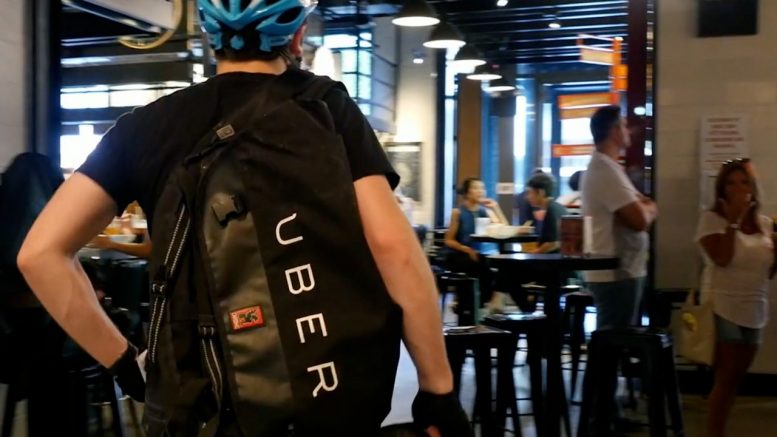Last week, Uber settled a class action employee misclassification suit in California and Massachusetts that, had it lost, could have forced the company to reevaluate its core business model.
At the center of the case was whether drivers are indeed independent contractors, as Uber would have it, or should be classified as employees. The main distinction is that if drivers are employees, then Uber has to front the costs of operations and pay benefits like health insurance.
The settlement agreement boils down to one thing: If a judge accepts the terms, Uber can still treat its drivers as independent contractors, in exchange for a number of concessions that address just a few of the concerns that drivers had expressed throughout the case.
What does this mean for Uber riders?
As a rider, not much is changing. (Had things gone differently, reclassifying Uber drivers as employees might have led to significant changes, including higher prices.)
The main part of the settlement that directly affects Uber riders is the company’s agreement to stop saying that the tip is included in the fare. Because it never was.
Drivers were often discouraged from soliciting tips from riders because the company argued the extra step made the experience much less seamless and thus less on-demand. But riders were never prohibited from tipping their drivers; they were just told they didn’t need to.
That’s mostly because Uber didn’t want riders to have to carry around cash. The bottom line is: Tipping was always an option.
The settlement does not require Uber to add an in-app tipping feature similar to rival Lyft’s, which allows riders to add a tip to their electronic bill. But if there’s enough pressure on riders to start shelling out extra dollars per ride in loose cash, Uber may be forced to consider integrating the feature in order to maintain its seamless rider experience. (Many see Uber’s cashless, friction-free payment experience as a positive differentiator from taxis.)
What does this mean for Uber drivers?
The biggest change for U.S. drivers outside of California and Massachusetts is that they cannot be deactivated from the platform — Uber’s term for getting fired — for failing to accept a minimum number of ride requests.
Previously, drivers would receive emails or other forms of communication warning that they would be deactivated if they did not raise their acceptance rate to at least 80 percent of all ride requests.
Here’s an example of an email a driver received:
Last month, you accepted less than 80% of trips you were connected with. This level of acceptance severely degrades the Uber user experience for both riders and partners, as well as lowering the amount you’re able to earn while using the platform. Our data shows that partners who accept at least 90% of trips earn 40% more than partners with low acceptance rates.
Please improve your acceptance rate if you want to continue to use the Uber platform.
Otherwise, U.S. drivers outside of Massachusetts and California will operate in largely the same way.
What about for drivers in Massachusetts and California?
Drivers in these two states will see more significant changes — but that’s not saying much. Specifically, they’ll get some cash and a new appeals panel.
For one, drivers in these states will be entitled to a piece of the $84 million the company has agreed to pay as part of the settlement, as well as part of a second payout pool of $16 million if Uber ever goes public.
The distribution of the money that drivers receive will be based on:
The plaintiffs’ attorney, Shannon Liss-Riordan, expects that claim rate to be 50 percent, she wrote in a court filing last week.
In that case, California drivers who drove the most — or more than 25,000 miles — and were certified members of the class would receive an average of about $8,000. If 100 percent of the eligible drivers claimed their share, that number drops to $1,950.
The rest of the drivers who were members of the class and drove between zero and 25,000 miles will receive between $24 and $1,137 if every single member of the class filed a claim to receive a share.
In Massachusetts, drivers who drove more than 25,000 miles will receive an average of $949 if 100 percent of drivers submit a claim. Based on the numbers Liss-Riordan included in the declaration, class members in California have been allotted about 80 percent of the payout.
A breakdown of what drivers will get from the settlement if there is a 100 percent claim rate
All together, the estimated average settlement shares listed in Liss-Riordan’s declaration add up to around $73 million. This leaves more than $10 million of the initial payout of $84 million, which will likely cover legal and other fees.
The most significant long-term impact of the settlement for drivers comes in the form of an appeals panel, through which drivers can appeal the company’s decision to deactivate them, and a driver association that serves in the place of a union but will not be legally recognized as one.
So at the very least there is a protocol for attempting to remedy what a driver might see as a wrongful deactivation. The appeals panel, made up of highly rated drivers, will recommend whether a deactivation should be overturned. Uber ultimately has the final say.
The driver association, on the other hand, formalizes the channels of communication that drivers all over America have been attempting to forge through various ad-hoc and online-based driver groups. But now, Uber has committed to meeting with the elected leaders of this association on a quarterly basis.
Again, the company has made no promises and has explicitly stated that drivers can’t try to collectively bargain for better fares through this association. For drivers in these two states, this might centralize many of the driver groups and efforts, thus making it easier to organize a critical mass of people under one cause. It may also serve as a model for similar systems in other states.
Until now, this has been an obstacle for the company’s amorphous labor force of drivers.
What does this mean for Uber?
Uber is the clear winner in the settlement, because the company still gets to call its drivers independent contractors. (To be sure, a judge still has to accept the terms of the agreement, which means Uber could be forced to go to trial and argue its case in front of a jury.)
But it also means the company is now an even bigger target.
In fact, just a few hours after Uber announced the settlement, another group of drivers in Florida filed a suit seeking to organize drivers nationwide, alleging the company misclassified them as independent contractors. That’s because the settlement in no way precludes drivers in states outside of Massachusetts and California from suing Uber for the same exact thing.
Further, class action suits are driven by lawyers, and while the terms of the settlement work largely in Uber’s favor, the payout signals the company is willing to cough up a fair amount of cash to make these problems go away, labor lawyer Tom Rohback told Re/code.
So class-action lawyers in search of a winning case with a big payout will be looking for new opportunities to get a piece of the cash cow that is Uber.
What about the rest of the “gig economy”?
We can expect to see some shifts in the industry as companies with a similar contractor model implement changes that will alleviate threats of similar lawsuits. As Uber continues to become a bigger target, so too do its counterparts in the sharing economy.
The question of whether workers are contractors or employees centers largely on how much control the company exerts over them. So, gig economy companies that depend on independent contractors may be forced to reevaluate the way they treat their contractors.
Some may even choose to preemptively classify them as employees in order to avoid a lengthy and expensive legal battle. This has already started happening: Startups Shyp, Luxe, Instacart and Honor have all shifted completely or partially to a traditional employee model.
Source: recode.net




